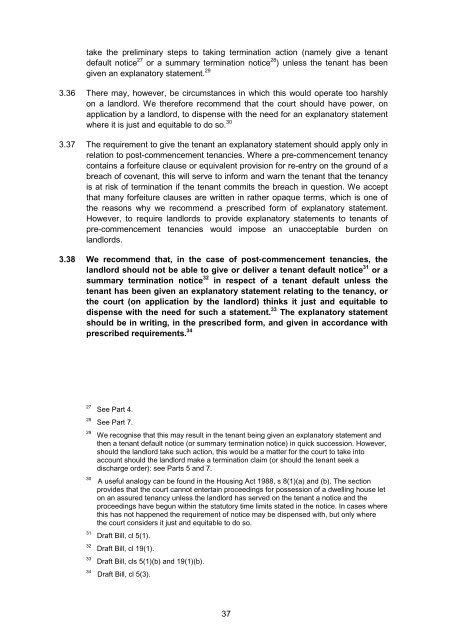Termination of Tenancies for Tenant Default - Law Commission
Termination of Tenancies for Tenant Default - Law Commission
Termination of Tenancies for Tenant Default - Law Commission
Create successful ePaper yourself
Turn your PDF publications into a flip-book with our unique Google optimized e-Paper software.
take the preliminary steps to taking termination action (namely give a tenant<br />
default notice 27 or a summary termination notice 28 ) unless the tenant has been<br />
given an explanatory statement. 29<br />
3.36 There may, however, be circumstances in which this would operate too harshly<br />
on a landlord. We there<strong>for</strong>e recommend that the court should have power, on<br />
application by a landlord, to dispense with the need <strong>for</strong> an explanatory statement<br />
where it is just and equitable to do so. 30<br />
3.37 The requirement to give the tenant an explanatory statement should apply only in<br />
relation to post-commencement tenancies. Where a pre-commencement tenancy<br />
contains a <strong>for</strong>feiture clause or equivalent provision <strong>for</strong> re-entry on the ground <strong>of</strong> a<br />
breach <strong>of</strong> covenant, this will serve to in<strong>for</strong>m and warn the tenant that the tenancy<br />
is at risk <strong>of</strong> termination if the tenant commits the breach in question. We accept<br />
that many <strong>for</strong>feiture clauses are written in rather opaque terms, which is one <strong>of</strong><br />
the reasons why we recommend a prescribed <strong>for</strong>m <strong>of</strong> explanatory statement.<br />
However, to require landlords to provide explanatory statements to tenants <strong>of</strong><br />
pre-commencement tenancies would impose an unacceptable burden on<br />
landlords.<br />
3.38 We recommend that, in the case <strong>of</strong> post-commencement tenancies, the<br />
landlord should not be able to give or deliver a tenant default notice 31 or a<br />
summary termination notice 32 in respect <strong>of</strong> a tenant default unless the<br />
tenant has been given an explanatory statement relating to the tenancy, or<br />
the court (on application by the landlord) thinks it just and equitable to<br />
dispense with the need <strong>for</strong> such a statement. 33 The explanatory statement<br />
should be in writing, in the prescribed <strong>for</strong>m, and given in accordance with<br />
prescribed requirements. 34<br />
27 See Part 4.<br />
28 See Part 7.<br />
29 We recognise that this may result in the tenant being given an explanatory statement and<br />
then a tenant default notice (or summary termination notice) in quick succession. However,<br />
should the landlord take such action, this would be a matter <strong>for</strong> the court to take into<br />
account should the landlord make a termination claim (or should the tenant seek a<br />
discharge order): see Parts 5 and 7.<br />
30 A useful analogy can be found in the Housing Act 1988, s 8(1)(a) and (b). The section<br />
provides that the court cannot entertain proceedings <strong>for</strong> possession <strong>of</strong> a dwelling house let<br />
on an assured tenancy unless the landlord has served on the tenant a notice and the<br />
proceedings have begun within the statutory time limits stated in the notice. In cases where<br />
this has not happened the requirement <strong>of</strong> notice may be dispensed with, but only where<br />
the court considers it just and equitable to do so.<br />
31 Draft Bill, cl 5(1).<br />
32 Draft Bill, cl 19(1).<br />
33 Draft Bill, cls 5(1)(b) and 19(1)(b).<br />
34 Draft Bill, cl 5(3).<br />
37

















